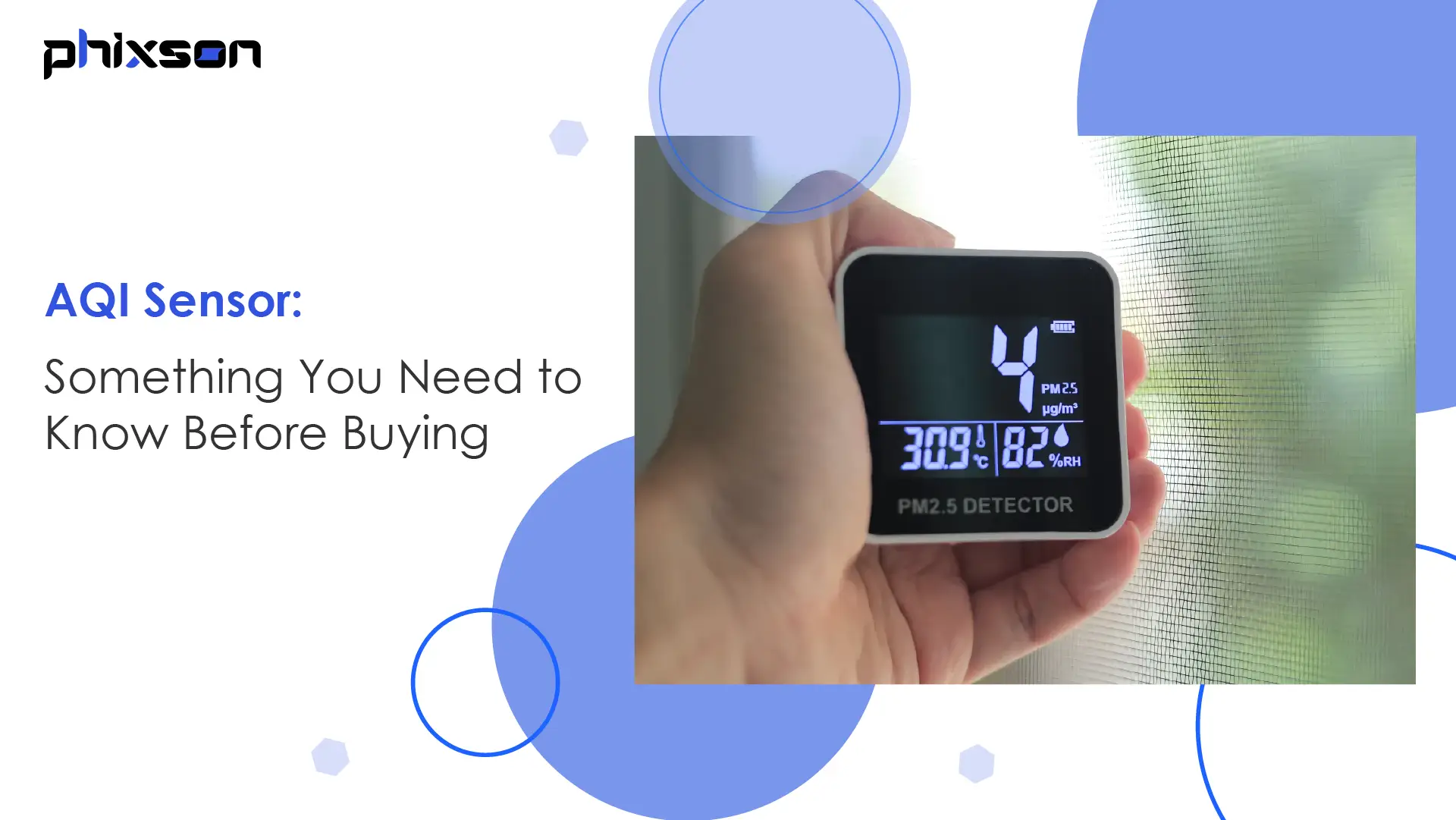This blog will deeply introduce the definition and using method of the AQI sensor. Also, we would recommend five useful AQI monitors for the home, which benefits health and daily life a lot.
What Is An AQI Sensor?
Definition
AQI sensor is a technological product containing potential electrolysis sensing technology, light scattering detection technology and high-tech telecommunication technology.
For gas and inhalable particulate concentrations, AQI detectors have simultaneous monitoring capacity. It can manage more than parameters at once with an automatic sampling and analysis function. And it also automatically calculates daily and monthly averages. This can’t be realized without its strong data-storing capacity.
For concentrations of PM10, PM5, PM2.5, PM1.0 and TSP cutters, AQI sensor comes with a powerful air pump which ease the detecting of the inhalable particulate matter.
Working Principle
The working process of an AQI sensor contains three steps- detection, signal transform & analysis as well as telecommunication.
In the testing process, the gas detection module in the device can sensitively sense with single-chip microcomputer technology. It is used for continuously monitoring SO2, NO2, O3, CO, H2S, NH3, and HF gases in the environment. In order to address cross interference between different gases during testing, some AQI sensors are armed with professional filters to ensure accurate and reliable monitoring results. Meanwhile, the inhalable particle detection module plays an important role, too. This module utilizes a laser light source, ensuring that the mass concentration conversion coefficient remains unaffected by particle color. Also, it uses a laser light source to ensure accurate measurement and features a replaceable particle cutter compatible with various particle separation cutters.
In the process of signal transform and analysis, the gas reactions on the working electrode through a porous membrane. On the working electrode, the properties of the reaction are determined by the thermodynamic potential which will be regulated by the constant potential controller regulates. Then the current signal from the controller becomes a voltage signal.
In the process of telecommunication, the collected data goes the control center or the cloud for processing via communication technologies, such as Wi-Fi, Bluetooth, and Zigbee. After the control center or the cloud will process and analyze the received data, users will get the AQI data from its mobile phone with ease.
What Is the Air Quality Index?

Prior to introducing how to measure AQI, I think we should know what AOI is.
The EPA uses the Air Quality Index (AQI) to describe the air quality for people in the form of colors, numbers, and word expression.
In daily life, the AQI is expressed by one of these colors. This help you know the air quality in a quick glance. The colors range from green to yellow to orange to red to purple and finally brown. Each color indicates a decline in air quality compared to the next color. For example, on hazy days, we often see a lot of Yellow, Orange, and Red AQI colors. That means air quality isn’t good.
AQI number is a detailed expression to show people how good or bad the air quality is, with numbers from 0 to 500. The dirtier the air is, the bigger the numbers are. The following sheet shows how the AQI numbers match up with the AQI colors.
How to Measure Air Quality At Home?
After connecting the socket through the data cable, home AQI monitor automatically starts to detect the air quality. In order to collect air smoothly, please place it in the appropriate position referring to the instructions.
If you need to connect it to wifi, please press the pairing button on the AQI sensor. When the indicator blinks, the device is successfully connected. At this point, you will be able to interact with your device and check the real-time air quality on your mobile app.
The Best 4 AQI Sensors for Home
Top 1 Smart Air Quality Monitor
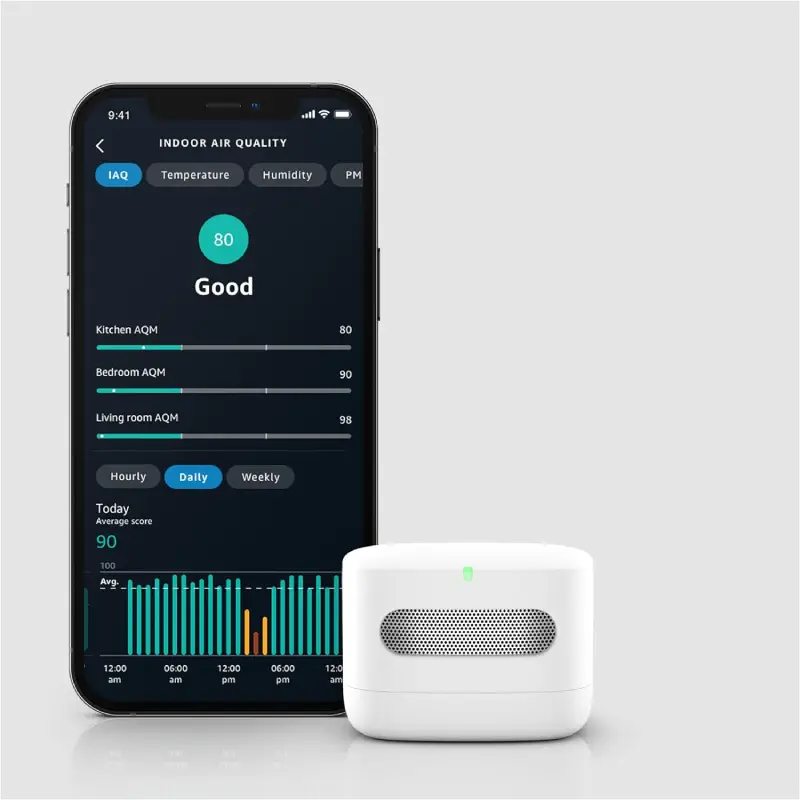
| Dimensions/Weight | 65x65x45mm/120grams | Brand | Amazon |
| Calibration | Auto calibration and self-cleaning at startup and routine intervals | Compatibility | Compatible with all Echo Family Devices and Alexa App version 2021.16 and later |
| Status Indicator | Multi-color LED status indicator | Network Connection | 2.4GHz Wi-Fi and BLE 4.2 |
| Operating Condition | Temp.: 0°C to 40°CHumidity: 0% to 80%Location: Indoor only | Power Supply | Input: 100-240V 50/60Hz AC Output: 5.0V 1A (5W) |
| Range | Temperature: 15 °C to 30 °CCO: 0 ppm to 70 ppmVOC: 0 – 500 pointsPM 2.5: 0 – 500 µg/m³Humidity: 30% to 70% RH | Accuracy (Deviation will be larger if exceeds product lifetime) | Temperature: ±1.0 °CHumidity: ±10% at 25 °CVOC: ±10 points PM 2.5: ±20 µg/m³ CO: ±5 ppm |
A big air vent ensure good collection of air for getting precise AQI result. A simple appearance with a multi-color LED indicator light allows you to know the air quality at a quick glance. Wifi connection helps you acquire a detailed air quality index on your mobile app even though you stay far away from the device.
Top 2 Type-C Wifi Air Sensor
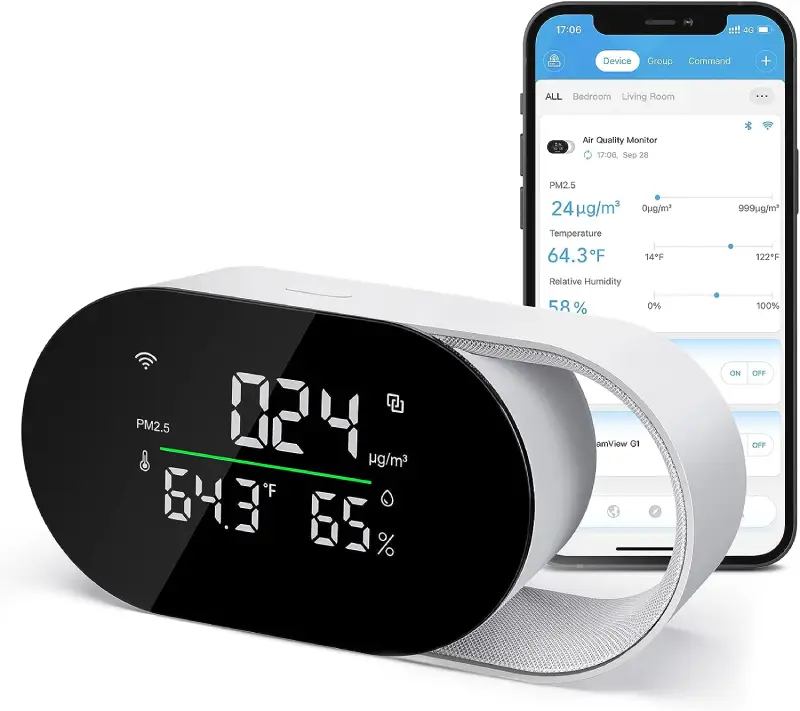
| Power Source | Type-C Powered | Item Weight | 0.34 Pounds |
| Brand | GoveeLife | Operating Humidity | 93 percent |
| Product Dimensions | 5.31 x 1.57 x 2.47 inches | Included Components | Air quality monitor, Type-C cable |
| Measurement Accuracy | PM2.5 Accuracy: ±15 ug/m³ | 0 to 100 ug/m³, ±15% | 100 to 1000 ug/m³; Temperature Accuracy: ±0.54℉; Humidity Accuracy: ±3% | Network Connection | 2.4G WiFi |
The big screen shows AQI clearly. Bight mode and night mode of the screen are switchable by easy long pressing the button on the top.
Top 3 Phixson White Label AQS-1 AQI Sensor
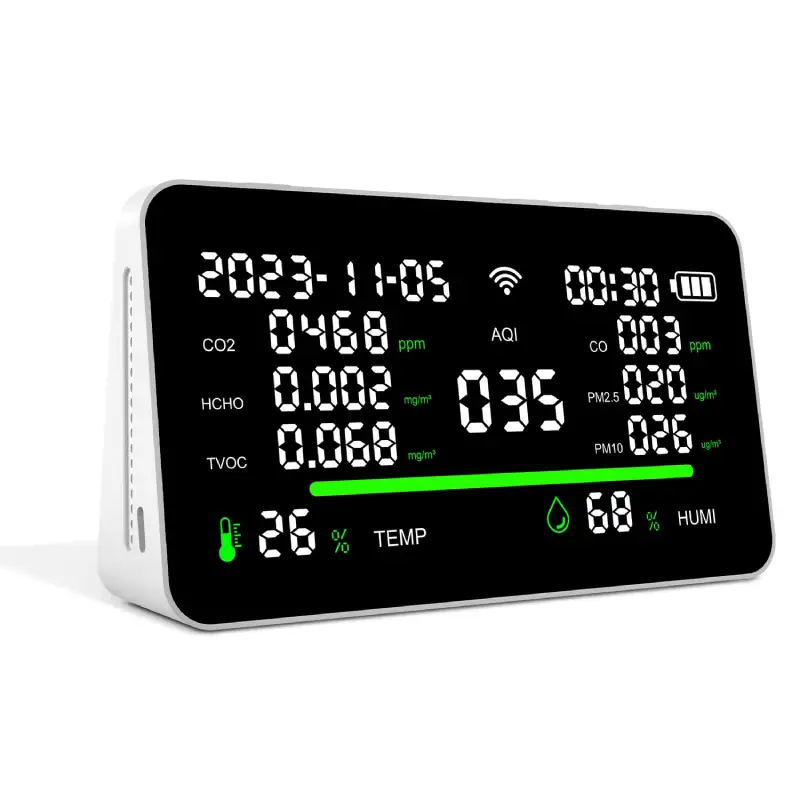
| DimensionsWeight | 7.28 x 2.09 x 4.69 inches/14.07 ounces | Batteries | 1 Lithium Ion batteries required |
| Brand | Phixson | Network Connectivity | 2.4G Wi-Fi |
9-in-1 functionality offers the real-time data of AQI, CO, PM2.5,PM10, TVOC, HCHO, Co2, temperature and humidity. If you want to know more about ODM or OEM, please feel free to check the air quality sensor catalogue.
Top 4 PT02 Plus-4 AQI Sensor
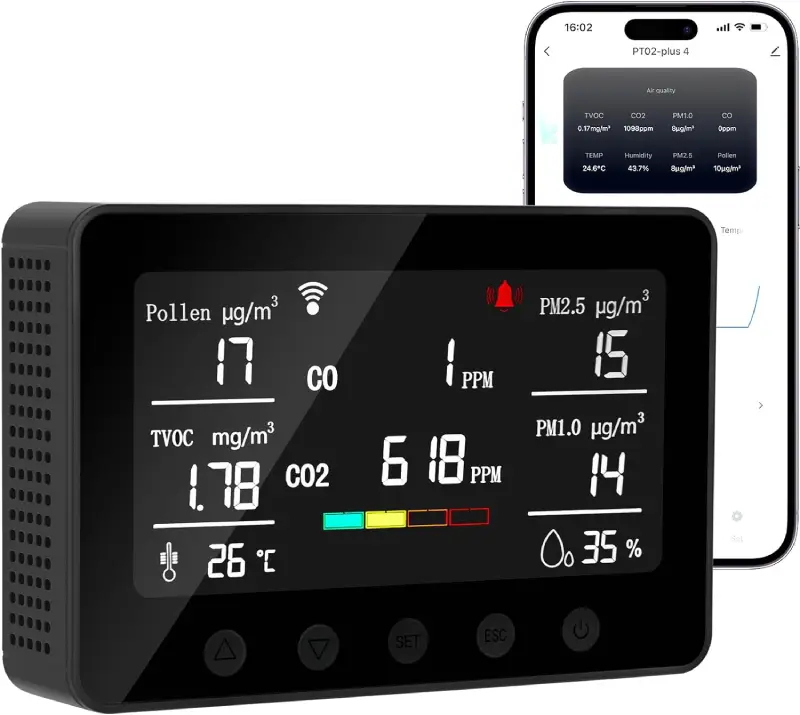
| Power Source | DC | Item Weight | 2 Pounds |
| Alarm | Audible | Voltage | 5 Volts |
| Product Dimensions | 7.09 x 1.54 x 4.69 inches | Wattage | 15 watts |
| Batteries Required | No | Color | Black |
| Range | Pollen: 0-500μg/m3CO: 0-999PPMCO2 : 400-5000ppmTVOC : 0-19.99mg/m3PM1.0 : 0~500μg/m3PM2.5 : 0~500μg/m3Temperature:-20°C-60°C;±2 °CHumidity:5%-95%RH;±5%RH | How to test it | Carbon monoxide is generated in incomplete combustion and dense smoke. We can take it close to a burning cigarette or paper to see if there is any change of the indicated color. |
Wall-mounted AQI detector provides five buttons for easy offline control , while it also support Wifi connection to your phone app if you need.
How Does An AQI Sensor Benefit Us?
AQI Sensor monitor the content of PM2.5, PM10, CO2, and other harmful particles in the surrounding air. Real-time data would be transmitted to our mobile app by telecommunication technology, so air quality status are always available for you anytime anywhere.
It can also warns you by sending alerts through the app when air quality gets worse. So you can take actions like closing windows or using the air purifier.
It can become one of points in your home IoT network system. For example, it connects to your air purifier and adjusts it based on air quality. This is very automatic and convenient.
Last, you can review the history of air quality data on the app. This helps you understand trends and assess your family’s health status.
Takeaway
The smart air quality detector provides us with a new healthy lifestyle. Through real-time monitoring and early warning, it effectively reduces the harm of indoor and outdoor air pollution to our body. At the same time, it can also help us better understand our living environment and improve the our quality of life.
